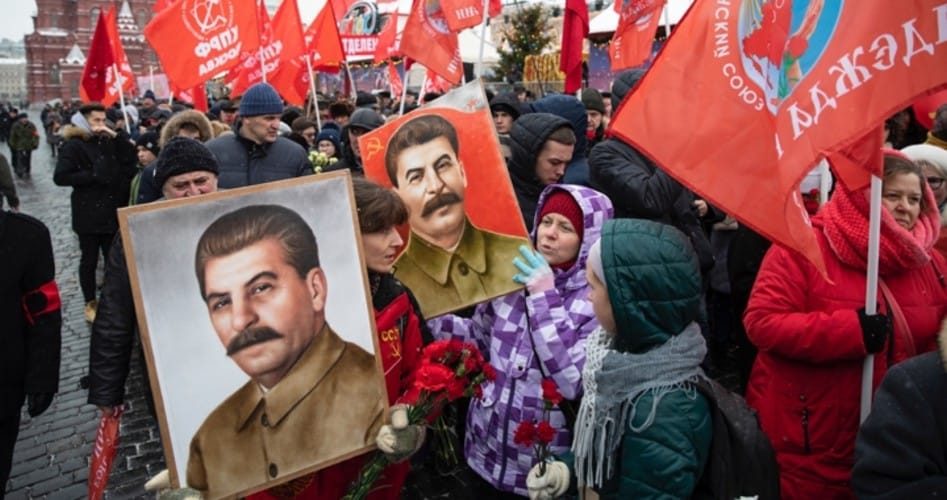
The late Soviet dictator Joseph Stalin is enjoying a resurgence in popularity in the land he ruled for three decades with an iron fist. A survey conducted by the Levada Center, a Russian polling firm, finds that over half of Russians have a positive view of Stalin, a record approval rating for the tyrant — at least in the years when one could voice disapproval without being shot.
Stalin’s popularity is on a decidedly upward trend. “The share of Russians who regard Stalin with respect has grown 12 percent, while the share of those who perceive the Soviet leader indifferently or negatively decreased by almost three times since 2015,” reports RT.com.
Many of those who don’t like Stalin still tend to have a favorable view of his reign of terror. “As many as 70 percent consider Stalin’s role in the country’s history ‘rather positive,’ praising him for defeating Nazism,” wrote RT. “Meanwhile, 19 percent say he played a negative role.”
Although the world is certainly a better place for the Allies’ having destroyed Nazism, Stalin made Adolf Hitler look like a piker when it came to mass murder. Hitler is responsible for the deaths of about 20 million people; Stalin killed perhaps triple that, including deliberately starving to death as many as 10 million Ukrainians in 1932 and 1933.
Stalin’s Soviet Union was a brutal one-party state where no dissent was brooked. The secret police tortured and killed countless people. Others were shipped off to Siberia to die of cold and hunger. Yet today, a mere 45 percent of Russians “consider the mass repressions during the Stalin era to be unjustified,” down from 60 percent in 2008, according to RT.
Stalin’s great-grandson Jacob Dzhugashvili, however, is not among them. RT says that he “has harshly denounced the high approval rating of his notorious relative” and “slammed those who consider the mass political repression of the Stalin era ‘justified’ and casted doubted [sic] on their moral standards.”
Sadly, moral standards in Russia aren’t low just among communist sympathizers, who could be expected to stick up for Stalin. Other political groups’ opinions of the tyrant are improving as well.
Some of this can be attributed to fading memories. Stalin died in 1953, and the Soviet Union officially ended in 1991. Three generations have grown up with no firsthand knowledge of Stalin, and one has never experienced the full-on communist state he helped create.
Some can also be attributed to a lack of knowledge. In mass media, Hitler is repeatedly held up as the epitome of evil, while Stalin and his fellow communists, who are estimated to have killed a combined 94 million people in the last century, barely get dishonorable mentions in the world’s rogues’ gallery.
This isn’t just a problem in Russia. A 2018 survey of American millennials found that they know little about communism or socialism and, therefore, the majority say they’d prefer to live in a socialist or communist country than a capitalist one — undoubtedly because they’ve learned from the media and their state educations that capitalism is evil. Almost a third of them think former President George W. Bush is responsible for more deaths than Stalin.
Another cause of Stalin’s rising popularity is the “politicization of society,” sociologist Leonid Bryzov told RT. “Stalin is seen as a champion of the oppressed,” he said. “This is a purely mythological image, which is a far cry from the real historical figure.”
This, too, is a problem in America, where everything, thanks to the Left, has become a political issue. Thus, Democratic politicians can now safely voice full-throated support for socialism. Unaware of the real history of socialism (or capitalism), gullible voters throw their support behind such politicians, believing that they really are champions of the oppressed who will vanquish the privileged and lead us into a utopia where everyone is equally prosperous. That way, of course, lie the moribund economy and political tyranny of every nation that has ever embraced socialism. (Case in point: Venezuela.)
Instead of contenting themselves with feel-good myths, Russians — and everyone else — would do well to acquaint themselves with the real Stalin and the rest of the bloody, poverty-ridden history of the Union of Soviet Socialist Republics.
Photo of Russians holding portraits of Stalin in Moscow’s Red Square, Dec. 21, 2018: AP Images


